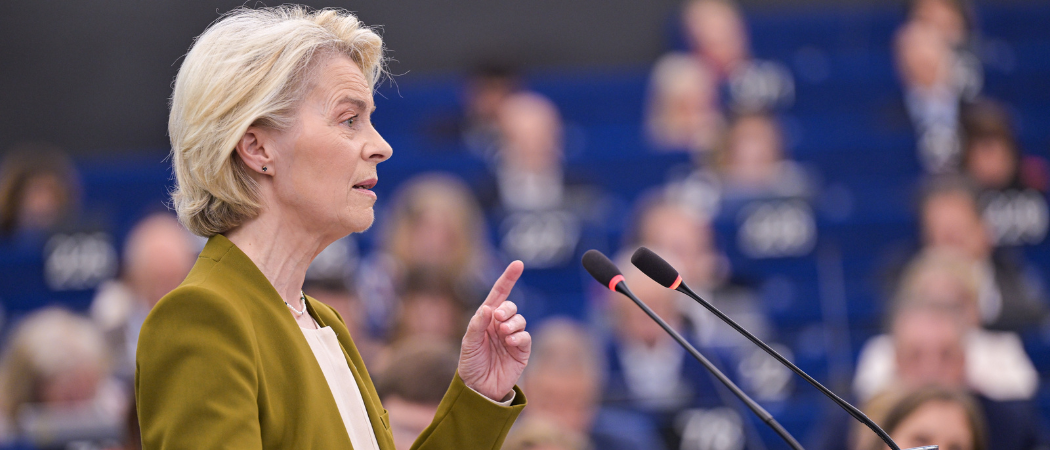Commission president ties tech sovereignty to Europe’s future security in state of the union address

European Commission President Ursula von der Leyen. Photo credits: Dati Bendo / European Union
European Commission President Ursula von der Leyen placed competitiveness, research and innovation at the heart of her annual State of the European Union address, arguing that Europe’s “independence will depend on its ability to compete in today’s turbulent times.”
“We have seen how dependencies can be used against us,” she said. “This is why we will massively invest in digital and clean tech.”
In her hour-and-a-half speech to the European Parliament in Strasbourg, von der Leyen pointed to the Commission’s next budget proposal for a new Competitiveness Fund and a plan to double the budget of Horizon Europe, the EU’s research and innovation programme, as key pillars of the strategy to strengthen Europe’s independence.
“This must be Europe's independence moment,” she said. “To be able to take care of our own defence and security. To take control over the technologies and energies that will fuel our economies.”
Von der Leyen also underlined work-in-progress to address key bottlenecks identified by the Draghi report, from energy to capital, from investment to simplification, noting that the Commission’s plan to cut red tape could save European companies €8 billion each year.
Soon after the speech, MEPs backed a resolution building on the Draghi report that urges stronger action to boost Europe’s global competitiveness, warning that without reforms the EU risks falling behind in a context of geopolitical instability.
Single Market and competitiveness
A central part of the Commission agenda, von der Leyen said, is completing the Single Market to secure a united Europe.
She went on to announce that the Commission will present a “Single Market roadmap to 2028,” targeting long-standing barriers in finance, energy and telecommunications, and introducing a new “fifth freedom” for knowledge and innovation. She also confirmed plans to finalise the so-called 28th regime, a single set of rules to help companies scale quickly across EU borders.
To support fast-growing companies, the Commission will also launch a multi-billion-euro Scaleup Europe Fund with private investors. The initiative aims to provide risk capital that European start-ups in quantum, AI and biotech often seek abroad, leading to lost jobs, wealth and tech sovereignty, she said.
Related articles:
- The road to FP10 is paved with missing details
- What’s coming up in research policy in the second half of 2025?
AI and tech sovereignty
Artificial intelligence featured prominently in the address as a cornerstone of the Commission’s strategy.
“A European AI is essential for our future independence. It will help power our industries and our societies, from healthcare to defence,” von der Leyen said. The Commission is investing in AI gigafactories to support start-ups, while European business leaders are expected to present a declaration soon pledging fresh investment in Europe’s technological sovereignty, she added.
Von der Leyen also mentioned the proposed Choose Europe package, which will have €500 million to attract and retain leading scientists and researchers. It is imperative for Europe “to step up where others have stepped away,” she said.
Then, von der Leyen linked Europe’s independence to energy security as well, calling for an end to reliance on Russian fossil fuels and a rapid scale-up of homegrown renewables. To support this shift, she said, the Commission will present a grids package to modernise infrastructure and speed up permitting, alongside a new “energy highways” initiative targeting eight critical bottlenecks in Europe’s energy network.
Beyond competitiveness, von der Leyen announced the launch of a new Global Health Resilience Initiative, warning that “we are on the brink – or even at the start – of another global health crisis” and urging Europe to take the lead on preparedness.
First reactions
The Guild of European Research-Intensive Universities and the League of European Research Universities (LERU), two of the most prominent research lobbies in Brussels, welcomed von der Leyen’s emphasis on research and innovation.
Kurt Deketelaere, secretary general of LERU, saw reassuring points in the speech, stressing her broader call for unity across EU institutions. “Without unity, Europe is in a dead-end street,” he said in a statement.
“It was good to see the important role of research and innovation recognised explicitly, on the proposed doubling of funding for Horizon, the need to realise the fifth freedom of the Single Market, and the need for Europe to be competitive through new knowledge and new solutions,” Jan Palmowski, secretary general of the guild, told Science|Business.





 A unique international forum for public research organisations and companies to connect their external engagement with strategic interests around their R&D system.
A unique international forum for public research organisations and companies to connect their external engagement with strategic interests around their R&D system.